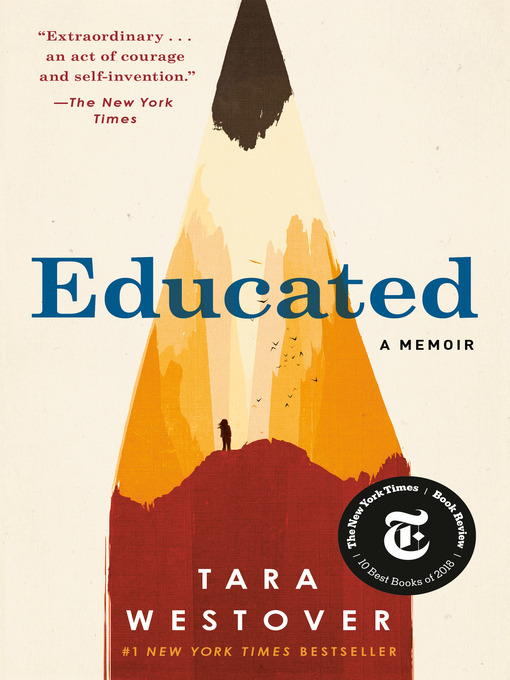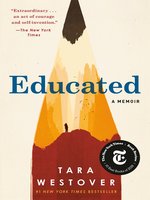-

December 1, 2017
A recent Cambridge University doctorate debuts with a wrenching account of her childhood and youth in a strict Mormon family in a remote region of Idaho.It's difficult to imagine a young woman who, in her teens, hadn't heard of the World Trade Center, the Holocaust, and virtually everything having to do with arts and popular culture. But so it was, as Westover chronicles here in fairly chronological fashion. In some ways, the author's father was a classic anti-government paranoiac--when Y2K failed to bring the end of the world, as he'd predicted, he was briefly humbled. Her mother, though supportive at times, remained true to her beliefs about the subordinate roles of women. One brother was horrendously abusive to the author and a sister, but the parents didn't do much about it. Westover didn't go to public school and never received professional medical care or vaccinations. She worked in a junkyard with her father, whose fortunes rose and fell and rose again when his wife struck it rich selling homeopathic remedies. She remained profoundly ignorant about most things, but she liked to read. A brother went to Brigham Young University, and the author eventually did, too. Then, with the encouragement of professors, she ended up at Cambridge and Harvard, where she excelled--though she includes a stark account of her near breakdown while working on her doctoral dissertation. We learn about a third of the way through the book that she kept journals, but she is a bit vague about a few things. How, for example, did her family pay for the professional medical treatment of severe injuries that several of them experienced? And--with some justification--she is quick to praise herself and to quote the praise of others.An astonishing account of deprivation, confusion, survival, and success.
COPYRIGHT(2017) Kirkus Reviews, ALL RIGHTS RESERVED.
-

Starred review from December 11, 2017
A girl claws her way out of a claustrophobic, violent fundamentalist family into an elite academic career in this searing debut memoir. Westover recounts her upbringing with six siblings on an Idaho farm dominated by her father Gene (a pseudonym), a devout Mormon with a paranoid streak who tried to live off the grid, kept four children (including the author) out of school, refused to countenance doctors (Westover’s mother, Faye, was an unlicensed midwife who sold homeopathic medicines), and stockpiled supplies and guns for the end-time. Westover was forced to work from the age of 11 in Gene’s scrap and construction businesses under incredibly dangerous conditions; the grisly narrative includes lost fingers, several cases of severe brain trauma, and two horrible burns that Faye treated with herbal remedies. Thickening the dysfunction was the author’s bullying brother, who physically brutalized her for wearing makeup and other immodest behaviors. When she finally escaped the toxic atmosphere of dogma, suspicion, and patriarchy to attend college and then grad school at Cambridge, her identity crisis precipitated a heartbreaking rupture. Westover’s vivid prose makes this saga of the pressures of conformity and self-assertion that warp a family seem both terrifying and ordinary.
-

January 1, 2018
To the Westovers, public education was the quickest way to put yourself on the wrong path. By the time the author, the youngest Westover, had come along, her devout Mormon parents had pulled all of their seven children out of school, preferring to teach just the essentials: a little bit of reading, a lot of scripture, and the importance of family and a hard day's work. Westover's debut memoir details how her isolated upbringing in the mountains of Idaho led to an unexpected outcome: Cambridge, Harvard, and a PhD. Though Westover's entrance into academia is remarkable, at its heart, her memoir is a family history: not just a tale of overcoming but an uncertain elegy to the life that she ultimately rejected. Westover manages both tenderness and a savage honesty that spares no one, not even herself: nowhere is this more powerful than in her relationship with her brother Shawn, her abuser and closest friend. In its keen exploration of family, history, and the narratives we create for ourselves, Educated becomes more than just a success story.(Reprinted with permission of Booklist, copyright 2018, American Library Association.)
-

February 1, 2018
Raised on a secluded family compound in Idaho, Westover was seven before realizing the biggest difference between her family and others was not their remote home, or their Mormon religion--but that "we don't go to school." Westover helped the family maintain a minimalist existence through construction, scrapping, and midwifery, no matter how many injuries she sustained. But when the author's wounds go untreated, leaving her mother mentally compromised and herself an object of abuse, cracks in her upbringing began to appear. Westover's brother Tyler is the first to leave home for college, later encouraging her to do the same. "There's a world out there, Tara...it will look a lot different once Dad is no longer whispering his view of it in your ear." Starting her academic career at Brigham Young University, Westover continued to earn academic achievements, including a PhD in history from Cambridge University. VERDICT Explicit descriptions of abuse can make for difficult reading, but for a student who started from a point of near illiteracy, Westover's writing is lyrical and literary in style. With no real comparison memoir, this joins the small number of Mormon exposes of recent years. [See "Editors' Spring Picks," p. 29.--Ed.]--Jessica Bushore, Xenia, OH
Copyright 2018 Library Journal, LLC Used with permission.
-

September 15, 2017
Raised in the Idaho mountains by survivalist parents who eschewed schooling and doctors, Westover hungered so powerfully for education that she taught herself, getting to Brigham Young University and eventually Cambridge University for a PhD. One of the publisher's big books of the season.
Copyright 2017 Library Journal, LLC Used with permission.
-

March 26, 2018
Actor Whelan chooses a simple, straight reading of Westover’s memoir about growing up in a dysfunctional, abusive fundamentalist family. It’s a wise choice, partly because there are so many dramatic scenes throughout the book that it would exhaust the listener to have them dramatized, and partly because Westover portrays herself as a passive and compliant family member until the day she enters a classroom for the first time at the age of 17. Whelan creates an angry, gravelly voice for Westover’s paranoid, fundamentalist Mormon father, a controlling and abusive man terrified of the influence of teachers and doctors. While preparing for the imminent end of the world, he homeschools his children and keeps them ignorant of all events outside their isolated Idaho home. Some family members are maimed by hideous accidents, and physical fights are common in the household. Still struggling with the ingrained need to be loyal to her family, Westover eventually attends college and earns a Ph.D. from Cambridge University. Whelan smoothly guides listeners through Westover’s physical and emotional traumas as she powerfully conveys Westover’s transform from “a wicked thing” to a scholar. A Random House hardcover.
-

Starred review from May 1, 2018
Raised in an alternative Mormon home in rural Idaho, Westover worked as an assistant midwife to her mother and labored in her father's junkyard. Formal schooling wasn't a priority, because her parents believed that public education was government indoctrination and that Westover's future role would be to support her husband. But her older brother's violence and their family's refusal to acknowledge problems at home resulted in the teen contemplating escape through education. Admittance to Brigham Young University was difficult. Westover taught herself enough to receive a decent score on the ACT, but because of her upbringing, she didn't understand rudimentary concepts of sanitation and etiquette, and her learning curve was steep. However, she eventually thrived, earning scholarships to Harvard and Cambridge-though she grappled with whether to include her toxic family in her new life. Born in 1986, Westover interviewed family members to help her write the first half. Her well-crafted account of her early years will intrigue teens, but the memoir's second part, covering her undergraduate and graduate experiences in the "real world," will stun them. VERDICT A gripping, intimate, sometimes shocking, yet ultimately inspiring work. Perfect for fans of memoirs about overcoming traumatic childhoods or escaping from fundamentalist religious communities, such as Jeannette Walls's The Glass Castle and Ruth Wariner's The Sound of Gravel.-Sarah Hill, Lake Land College, Mattoon, IL
Copyright 2018 School Library Journal, LLC Used with permission.









